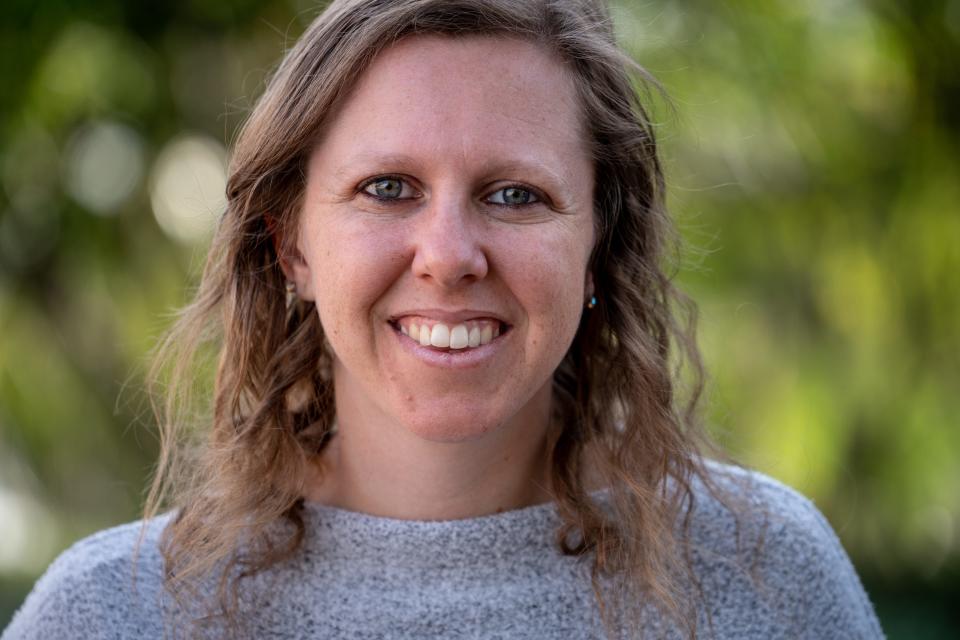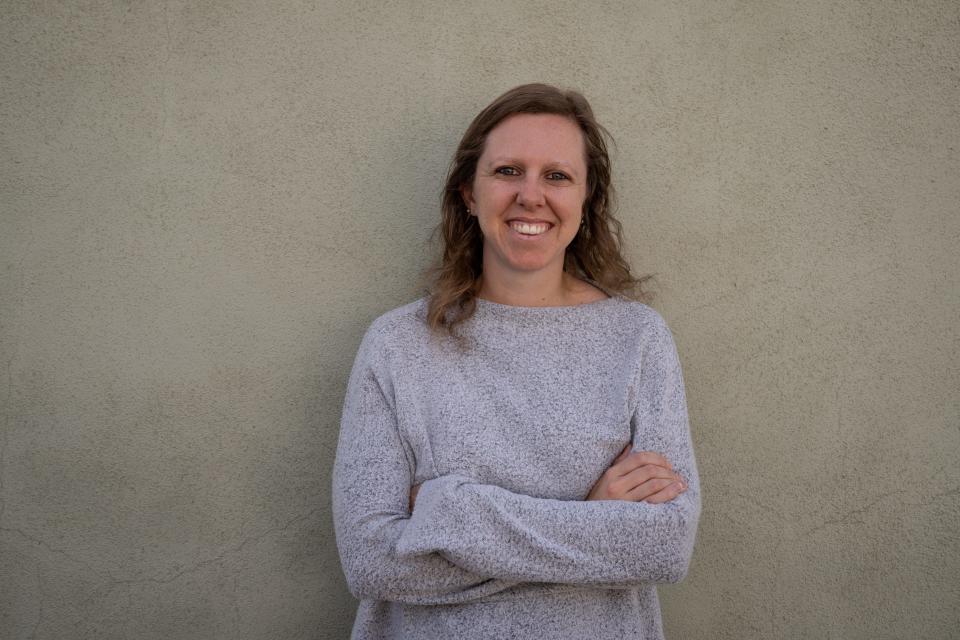How this woman combats Phoenix's housing crisis with empathy through court program
Katie Gentry has dedicated her career to finding solutions amid a rapidly escalating housing crisis in Phoenix. One thing is at the core of the answer — understanding the struggles of the homeless experience.
Gentry oversees Phoenix’s newly established Community Court, an initiative that promises to provide people experiencing homelessness who have committed low-level crimes with resources instead of a conviction.
Her role, she said, is to listen to community members and make sure they are connected with the services they need so they can "seamlessly" move through the court process.
"My job is to identify the needs of those folks coming into the program, and then figure how can we supply those resources either through city resources, or through grant funding, or whatever it may be," Gentry said.
Phoenix’s housing crisis is worsening at a rate that rivals record levels, an Arizona Republic analysis found.
Last year's clearing of "The Zone," the city's largest homeless encampment which used to be home to up to 900 people on any given night, as well as a rapidly rising wave of not-in-my-backyard-ism, has led the city to be under more pressure than ever to find ways to counter homelessness.
For Gentry, the answer lies in providing more services rather than pushing communities further into vulnerability.
"Homelessness is way closer than you think," Gentry said. "A lot of people are not more than one paycheck away from experiencing homelessness, a lost job, or a medical emergency... A lot of people stigmatize without realizing who those folks are. They're just like you and I."
A Community Court focused on people

Offering an empathetic, human-centered perspective on the issue is what prompted her to want to lead the city's Community Court program.
The court aims to connect unhoused people who have been cited for minor felonies with shelters, health services, substance abuse treatment, and workforce development programs to help them come out of homelessness, Gentry said.
Qualified participants work closely with a city prosecutor who assesses each person’s needs and provides a personalized plan for each case. Participants are given a choice to comply and “graduate” the program. If they choose not to go through the program, they would undergo the standard process of a traditional court.
"It's a completely new way to approach kind of the intersection of homelessness and criminal justice," Gentry said. "We have a lot of people for whom that intersection is the reason that their homelessness continues. So, I'm excited about the opportunity to potentially create some new pathways for people."
Gentry said since the Community Court launched in early January, participants have been successfully connected with essential resources throughout their process. One of the most pressing needs they have expressed, she said, is shelter. And so far, Gentry said many individuals who have joined the court program have been connected with rooms.
Some people at the Community Court have already had their charges dismissed and were working on a plan to get stable housing, "which is exactly why this court was set up," she said. "We want to get people on the right path rather than just criminalizing them through the court process."
Making a difference through empathy
Gentry said one of the things that struck her when she started working in homelessness was the lack of sympathy and understanding that she encountered.
"If you ask kind of the general person what should we do about homelessness, the common response that I hear is like, 'Well, they should just stop using drugs and we need to help their mental health,'" Gentry said. "That's definitely true, but it's so much harder than people think."
That stigmatization of the unhoused community and the disregard for their hardships was what compelled her to co-found Street Sense Solutions, a consulting company aimed at educating people about homelessness and connecting them with resources to get involved in solutions.
During the simulations, people get to experience the complexities, daily struggles and systemic barriers of homelessness in metro Phoenix. They have to walk through finding shelter, getting food, and getting the documentation they need to apply for certain programs, among many other steps that homeless people go through while navigating the system.
And what people who go through the simulation typically find, Gentry said, is a system that is particularly hard to navigate.
Kell Duncan, owner of The Churchill in downtown Phoenix, said he and staff at his business participated in Street Sense Solution's program in 2019. Duncan said the simulation was an "eye-opening" experience for him and the employees at the food court.

"What was really helpful, not only for me but everyone who did it, was to better understand the challenges to navigating the system," Duncan said. "A lot of people who are experiencing homelessness obviously don't want to be in that situation, and it's really challenging to get out of there. And that's what we saw."
Only about a quarter of participants can usually find shelter by the end of the simulation, according to Gentry. She said that outcome reflects the real situation of homelessness in Phoenix, where only about a third of individuals experiencing homelessness have access to shelter.
Duncan’s goal with hosting the simulation at his business was to build empathy around homelessness, particularly when unsheltered people tend to walk into the business every day, a situation that he said his team has been handling with more care and consideration.
After going through the program, Gentry said people usually walk out with more understanding and motivation to find ways to help.
For Duncan, looking for ways to support homelessness solutions has become a priority for his business since participating in the simulation, he said, and he was hoping to repeat the experience soon for new staff members who have joined.
“We, as part of our business model, give back to the community we’re in,” he said. “We would gladly do the simulation again. It’s probably time.”
A passion turned into a career
Gentry founded Street Sense Solutions when she arrived in Phoenix from Denver in 2016 through a one-year program with the Obama Foundation’s Community Leadership Corp.
She was making $900 a month working full time, she said. But she said she did it because she was following a passion that began when she went through a similar program she offers.
Originally from Portland, Gentry went on a 24-hour retreat in her youth in which she was forced to find a place to stay for the night, find food and navigate a system that offered little help. She said the experience opened her eyes and helped her build a heart for people in that situation.
After founding her company, Gentry worked at the Continuum of Care Program at the Maricopa Association of Governments, a program that aims to bring local nonprofits, direct service providers and jurisdictions together to prevent and address homelessness through a data-based approach.
Dillon Belmont, who worked with Gentry at the Continuum of Care, said her role was to administrate funding and find creative solutions to the hardships of the community.
"Katie, as the manager of our team, really spearheaded that formation," Belmont said. "Ending homelessness is something that really touches her."
Belmont said it comes naturally for Gentry to approach homelessness with compassion and understanding while still being analytical and practical. That led her work to "dramatically shift" how the Continuum of Care operates and influenced her to lead new solutions at the Community Court, he shared.
"Understanding and empathy go a long way," Belmont said. "There are stereotypes that persist, the falsehoods of thinking that people who are experiencing homelessness are doing so because they want to or because they're just drug addicts and not a benefit to society —That's simply untrue."
For both Belmont and Gentry, involving the whole community is a key part of change, and both encouraged people to be part of solution-seeking efforts as the city works to address the needs of those experiencing homelessness.
"Just understanding is a first step," Gentry said. "But I think everybody in our community can be doing something, and they just need to figure out what that something is like."
This article originally appeared on Arizona Republic: Meet Katie Gentry, one of the people behind Phoenix's Community Court

